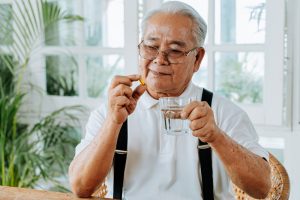Doctor On Call, or DOC for short, is a brand new series brought to you by Medical Channel Asia. This series aims to bring doctors and specialists from various fields to give you an introduction to common health and medical topics that you and the Asian population are interested in. In our 7th DOC, held on 19 Oct (Tuesday), from 8pm to 9pm (GMT+8), we have Dr Julian Tan, Interventional Cardiologist at The Cardiology Practice, to talk to us about Ischemic Heart Disease and how COVID-19 affects the heart.
This 3-part cardiology webinar series aims to educate the Asian population on the different aspects of cardiac conditions, ranging from the risk factors of heart diseases, to the most current updates on CPR, and the types of treatment options available after a heart attack.
For Part 1 of the forum, we have Dr Julian give us a short presentation on one of the most common heart disease: ischemic heart disease, and the treatment options available. In Part 2, Dr Julian answers some of the questions posted by our audience, both collated from the registration process, and also posted LIVE. Read below to find out what more about ischemic heart disease, and find out how COVID-19 can actually affect our hearts!
Question and Answer – Pre-collated segment
Q1: What is of a higher cardiac risk – taking the vaccine or contracting the virus? Since there are reports of cardiac issues from both.
Dr Julian: My answer is always: benefits over risks. The benefits of you being protected from COVID-19 infection far outweighs the very minute risks of the vaccines. Nothing in this world is 100% safe, same goes for the vaccines. In prescribing therapies and treatments, as doctors we always offer treatments that are beneficial for you, and never treatments that will harm you deliberately.
Q2: Is DASH diet one of the best approach/diet in managing patients with hypertension?
Dr Julian: There are many diets available that you may find on the Internet now. The diets may appear good on the surface (e.g. keto-diet is low or no carbohydrates). But on the flip side, the cholesterol levels are quite high, which will lead to risk of plaque build-up.
To answer this question, generally I would say if the diet is harmless, then there is no harm doing it. But I would still advice to stick to a moderate amount of diet, so that you do not miss out any particular food groups. Take everything in small amounts, which is the easiest and most sensible way of doing things.
Q3: A patient from my hometown at Makassar, Indonesia went through ECG and echo, and the results were normal. However, when an angiogram was done in Singapore, it showed 90% blockage. Why is this so?
Dr Julian: In terms of cardiac screening tests, the cheaper it is, the easier it is to perform, the more available it is, but the less accurate those tests are. The more expensive and more invasive tests will be more accurate and hence will give more details and pick up more diseases.
ECG and echo are inexpensive and easy tests to do, but accuracy is not the best. I think it is always important to check with your doctor the tests that are offered, and how the doctor sees the patient as a whole (age, family history etc.), and then the doctor will advice for more accurate tests to pick it up.
In this scenario maybe a CT angiogram could have been offered at the start to pick up the 90% blockage. CT angiogram is less invasive than the usual invasive angiogram. Hence, have the discussion with your doctor to see which test is ore appropriate.
Q4: I’m a nurse and I never really had the need to keep checking blood pressure and had no symptoms. However when I went for COVID-19 vaccination, my BP was at 130-140. Should I be diagnosed and would I need medications?
Dr Julian: There’s this phenomenon called white coat hypertension. It refers to patients getting nervous when they see a doctor or go to a clinic, even if you may not notice. Your body reacts to the stress and will elevate your blood pressure.
In this scenario you may have been anxious and worried about the side effects etc., and might be having white coat hypertension. One way to go about this is to do ambulatory blood pressure monitoring, where you have a device to take home and automatically measure your blood pressure every hour, and gives a more objective measurement of your blood pressure, to determine if you have hypertension or not.
Regardless, a systolic BP of 130-140 is not considered very high.
Q5: What must I avoid when I have permanent dual pacemaker implant?
Dr Julian: A pacemaker is an external device that helps to provide an electrical current to the heart to get it to pump at the correct rhythm. When patients’ own heart’s pacemaker becomes faulty, we will need this external pacemaker.
Regardless of whether it is dual or single pacemaker, nothing much needs to be avoided. Most of the newer pacemakers are MRI compatible (as compared to the older pacemakers). Of course if you go to the airports, usually the pacemaker company will give you a card to go through the Xray machine.
A week after the implant, you may want to avoid moving the left arm. After which there should not be much restrictions to your activities.
One more thing could be your mobile phones. Try to use the mobile phone on the right hand instead of the left, to avoid the signals from interfering with the pacemaker.
Other than that, no other real active things to avoid.
Q6: Is palpitation a concern if one was infected by COVID-19?
Dr Julian: Yes it is. One of the conditions that can occur when you get infected with COVID-19 is atrial fibrillation, where the rhythm of the heartbeat becomes irregular. People with AF have an increased risk of stroke. Patients with any form of infections (including COVID-19) predisposes them to AF, and therefore increases their risk of stroke.
But of course, you need to determine what kind of palpitations it is. Most people with fever, your body will mount a response, leading to an increase in heartbeat. If it is not an irregular type of heartbeat then it is not really a concern. It is only a concern if it becomes irregularly fast (130-150 beats per minute), even at rest, then it might be AF and you need to get that checked out.
Question and Answer – LIVE
Q1: What is the recommended frequency to undergo heart tests and check up?
Dr Julian: As mentioned before: men above the age of 40 and women above the age of 50 should go for a simple heart health screen. Not necessarily with a cardiologist, it can be done with the General Practitioner. Tests include cholesterol, blood sugars, ECG, chest x-ray etc. as a basic screen.
Subsequent frequency of the screen will depend on the results of the initial screen, as well as the risk factors. The usual recommendation is at least a yearly blood test. If you require medications for cholesterol or diabetes, then the usual follow-up is about 3 to 4 months, to repeat blood tests at each visit. Depending again on risk factors, you may do an ECG every 6 months. Some people do exercise treadmill test every 1 to 2 years.
Q2: Are there any medications that can dissolve the fat plaques without the need for procedure?
Dr Julian: There is no such medications currently that can completely dissolve the plaques that are stuck to the artery walls. You may have seen articles about suction that can suck out the plaques. But till date there is no such approved therapy that can approve the plaques completely.
There are only 2 main treatments available. 1st one is the using of a stent to open up the arteries by pushing the plaques to the side. 2nd treatment is the use of statins. They have been shown in human and animal studies to reduce the volume of the plaques. Although not completely eradicating them, it reduces the volume of the plaque and hence reduce the risk of heart attacks.
Q3: Can the plaque in the heart be reverse naturally? For e.g. exercise
Dr Julian: Minimally, it has not been shown exercise is able to completely remove the plaque. Exercise and healthy diets have their own benefits to the heart, such as increasing strength of the heart, and overall leading of a healthy lifestyle. It gives added benefits, but to completely remove the plaque by natural means is not likely to be possible.
Although there may be a couple of success anecdotal stories, there is no wonder natural treatment. Prevention is key, instead of wanting to remove the plaque, lead a healthy lifestyle early on and there will not have plaques build-up.
Q4: If I smoke, lead a sedentary lifestyle etc., when should I worry about developing heart diseases?
Dr Julian: I think if you know you are leading an unhealthy lifestyle, and have family history of heart diseases, best to get it screened earlier, and change to a healthier lifestyle earlier.
The youngest patient I have seen in my clinic is 21 years old, so do not think that heart attacks only happen to older people. We are seeing younger and younger patients who pass away due to heart attacks.
You have to do proper heart health screen, and never be too sure unless you do all the necessary checks.
Q5: Is it recommended to consume more food that are higher in ‘good’ fat? Does it help fight against the ‘bad’ fat?
Dr Julian: As I have alluded to before, moderation is key. In this world today, it is difficult to know what is good and bad. I think it is easier for all of us to enjoy all the food and our lives, but then take all of them in small, moderate amounts. Be sensible and responsible in your eating.
Rather than being caught up to what food to avoid and what more to take, take everything in small amounts. Quit your cigarettes, do regular exercises, see your doctor regularly (especially men above 40 and women above 50).
Q6: My mother has coronary artery disease. The doctor provided bypass and stenting. Which is better?
Dr Julian: Putting in a stent does not involve opening up the chest wall. The patient is awake and everything is done minimally invasive.
An open heart bypass is when the surgeons split open the chest wall, and you will be on general anaesthesia. Your heart will be stopped and connected to an external heart-lung machine, so that the surgeons can take a vein from your leg and bypass the heart arteries’ blockage. Basically a bypass does not remove any plaque, but instead creates a conduit to bypass the blockage.
Heart stenting does not involve a bypass. It goes directly into the arteries, and uses a scaffold to open up from the inside, by pushing the plaques to sides and opening up the arteries.
Q7: Why does a patient need to take both clopidogrel and aspirin after PCI?
Dr Julian: Stents are inert metal that are exposed when we put it into the arteries. When blood flows and gets in touch with the stents, there is potential for blood clots to form on the surface of the stents. Hence you need to be on 2 blood thinners after PCI to reduce the risk of blood clots to form on the metal.
Up till a point when your own cells grow over the surface of the stent. When your own cells lining on the inner surface of the stents, there will be less exposure to the metal and hence less chance of blood clots to be formed.
What’s next in store?
- Click here to see Dr Julian’s presentation in Part 1 if you have missed it!
- If you have missed our previous DOC webinars, visit our Medical Channel Asia’s YouTube page, or you can also read the articles:
- Doctor On Call (DOC): Dr Sean Leo – Common Sports Injuries Part 1, Part 2
- Doctor On Call (DOC): Dr Lee Fang Jann – Men’s Health Part 1, Part 2
- Doctor On Call (DOC): Dr Felix Li – Medical Aesthetics Part 1, Part 2
- Doctor On Call (DOC): Dr Michael MacDonald – The Silent Killer Part 1, Part 2
- Doctor On Call (DOC): Dr Jade Kua – DARE to Save a Heart Part 1, Part 2
- Doctor On Call (DOC): Dr Radhika Lakshmanan – Facts and Myths of Breast Cancer Part 1, Part 2












